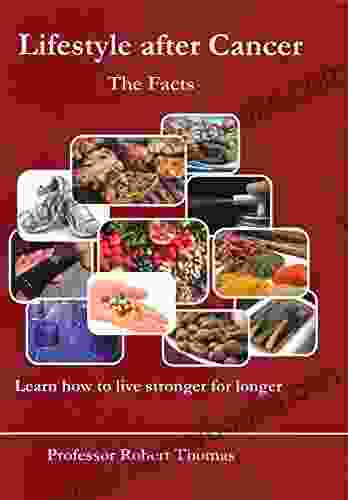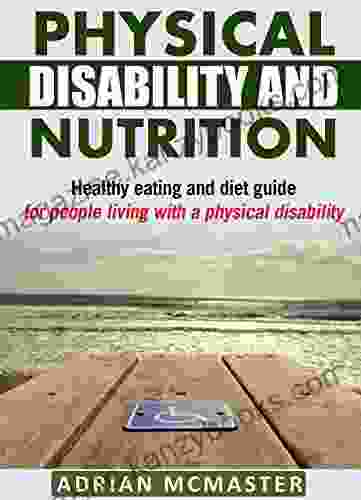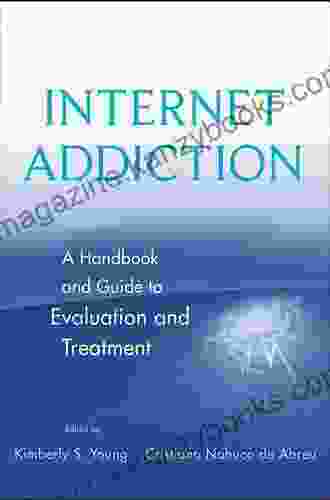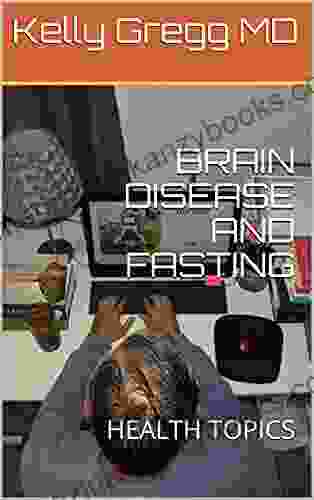Unlocking the Healing Power of Fasting for Brain Health: A Comprehensive Guide

In the realm of health and wellness, the concept of fasting has gained significant traction in recent years. While fasting has been practiced for centuries for spiritual and religious reasons, modern scientific research is now revealing its remarkable potential for improving brain health.
4.2 out of 5
| Language | : | English |
| File size | : | 2225 KB |
| Text-to-Speech | : | Enabled |
| Screen Reader | : | Supported |
| Enhanced typesetting | : | Enabled |
| Word Wise | : | Enabled |
| Print length | : | 6 pages |
| Lending | : | Enabled |
This article delves into the compelling body of evidence that supports the benefits of fasting for cognitive function, inflammation reduction, and neuroprotection. We will explore the mechanisms by which fasting exerts its positive effects on the brain, providing practical guidance on how to incorporate fasting into your lifestyle safely and effectively.
Fasting and Cognitive Function
Research has shown that fasting can significantly enhance cognitive abilities, including memory, learning, and attention. One study published in the journal "Cell Metabolism" found that intermittent fasting improved cognitive performance in mice by increasing the production of new neurons in the hippocampus, a brain region essential for memory formation.
Another study conducted at the University of California, Berkeley, demonstrated that short-term fasting improved working memory and reduced brain inflammation in healthy adults. These findings suggest that fasting may have therapeutic potential for cognitive decline and neurodegenerative diseases.
Fasting and Inflammation Reduction
Chronic inflammation is a major contributing factor to a wide range of health conditions, including brain diseases. Fasting has been shown to have potent anti-inflammatory effects throughout the body, including the brain.
A study published in the journal "Brain, Behavior, and Immunity" found that intermittent fasting reduced inflammation in the brains of mice with Alzheimer's disease, a neurodegenerative disFree Download characterized by progressive cognitive decline. The researchers attributed this effect to fasting's ability to lower levels of pro-inflammatory cytokines and increase the production of anti-inflammatory molecules.
Fasting and Neuroprotection
In addition to improving cognitive function and reducing inflammation, fasting has also been shown to protect the brain from damage and degeneration. Studies in animal models have demonstrated that fasting can enhance the brain's resistance to ischemic stroke, traumatic brain injury, and neurodegenerative diseases such as Alzheimer's and Parkinson's.
One mechanism by which fasting exerts its neuroprotective effects is by promoting autophagy, a process that removes damaged proteins and organelles from cells. By clearing out cellular debris, autophagy helps maintain neuronal health and prevents the accumulation of toxic proteins that can contribute to neurodegenerative diseases.
Types of Fasting
There are various types of fasting protocols, each with its unique benefits and drawbacks. Some of the most common types include:
- Intermittent Fasting: Involves alternating periods of eating and fasting, such as 16/8 fasting (fasting for 16 hours and eating within an 8-hour window each day) or 5:2 fasting (eating normally for five days and restricting calories to 500-600 calories on the other two days).
- Water Fasting: Involves consuming only water for a period of time, typically ranging from 24 to 72 hours.
- Juice Fasting: Involves consuming only freshly squeezed juices for a period of time, typically ranging from 3 to 7 days.
It's important to note that fasting should not be undertaken without consulting a healthcare professional, especially if you have any underlying health conditions. Your doctor can help determine the most appropriate fasting protocol for your individual needs.
Safety and Considerations
While fasting can be a powerful tool for improving brain health, it's crucial to prioritize safety and listen to your body. Some potential side effects of fasting include hunger, fatigue, headaches, and dizziness. It's important to stay hydrated by drinking plenty of water throughout your fast.
Fasting is not recommended for pregnant or breastfeeding women, people with diabetes, or individuals with a history of eating disFree Downloads. If you experience any severe or persistent symptoms during fasting, break your fast and consult a healthcare professional immediately.
The emerging body of scientific evidence strongly supports the profound benefits of fasting for brain health. Fasting can enhance cognitive function, reduce inflammation, and protect the brain from damage and degeneration. By incorporating fasting into your lifestyle safely and effectively, you can unlock the healing power of this ancient practice and optimize your brain's well-being for years to come.
For more in-depth information on fasting and its health benefits, refer to the comprehensive guide "Brain Disease and Fasting: Health Topics." This authoritative resource provides a wealth of practical advice, case studies, and scientific research to empower you in your journey towards optimal brain health.
Explore the Book
4.2 out of 5
| Language | : | English |
| File size | : | 2225 KB |
| Text-to-Speech | : | Enabled |
| Screen Reader | : | Supported |
| Enhanced typesetting | : | Enabled |
| Word Wise | : | Enabled |
| Print length | : | 6 pages |
| Lending | : | Enabled |
Do you want to contribute by writing guest posts on this blog?
Please contact us and send us a resume of previous articles that you have written.
 Book
Book Novel
Novel Page
Page Chapter
Chapter Text
Text Story
Story Genre
Genre Reader
Reader Library
Library Paperback
Paperback E-book
E-book Magazine
Magazine Newspaper
Newspaper Paragraph
Paragraph Sentence
Sentence Bookmark
Bookmark Shelf
Shelf Glossary
Glossary Bibliography
Bibliography Foreword
Foreword Preface
Preface Synopsis
Synopsis Annotation
Annotation Footnote
Footnote Manuscript
Manuscript Scroll
Scroll Codex
Codex Tome
Tome Bestseller
Bestseller Classics
Classics Library card
Library card Narrative
Narrative Biography
Biography Autobiography
Autobiography Memoir
Memoir Reference
Reference Encyclopedia
Encyclopedia Luca Zavarella
Luca Zavarella William Pullen
William Pullen Shawn Robbins
Shawn Robbins Sarah Stewart Holland
Sarah Stewart Holland Norman J Marcus
Norman J Marcus Kellie Hemmerly
Kellie Hemmerly Kim Eddy
Kim Eddy Mohammed Mouhssine
Mohammed Mouhssine Kim Koeller
Kim Koeller Kerrin Lucado D Angelico
Kerrin Lucado D Angelico Kimberley Wilson
Kimberley Wilson Kim Farnell
Kim Farnell Mercedes Lackey
Mercedes Lackey Sean Bartram
Sean Bartram Sierrareef Press
Sierrareef Press Theodore E Keats
Theodore E Keats Kelly J Caselman
Kelly J Caselman Laurenne Sala
Laurenne Sala Sarah Scheffel
Sarah Scheffel Rhonda Spencer
Rhonda Spencer
Light bulbAdvertise smarter! Our strategic ad space ensures maximum exposure. Reserve your spot today!

 Bret MitchellGet Ready for an Unforgettable Adventure: Dive into the World of "Go, Dog....
Bret MitchellGet Ready for an Unforgettable Adventure: Dive into the World of "Go, Dog....
 Christian CarterUnveiling the Mysteries of the Son of Man Revelation: A Journey to Divine...
Christian CarterUnveiling the Mysteries of the Son of Man Revelation: A Journey to Divine... Cristian CoxFollow ·13.1k
Cristian CoxFollow ·13.1k Federico García LorcaFollow ·9k
Federico García LorcaFollow ·9k Chad PriceFollow ·12.4k
Chad PriceFollow ·12.4k Ed CooperFollow ·12.8k
Ed CooperFollow ·12.8k Miguel NelsonFollow ·5.4k
Miguel NelsonFollow ·5.4k Jason ReedFollow ·17.1k
Jason ReedFollow ·17.1k Steven HayesFollow ·8.1k
Steven HayesFollow ·8.1k Mario BenedettiFollow ·14.2k
Mario BenedettiFollow ·14.2k

 Ernesto Sabato
Ernesto SabatoLoving Table: Creating Memorable Gatherings
Gatherings...

 Mark Twain
Mark TwainLifestyle After Cancer: The Facts
Cancer is a life-changing...

 Keith Cox
Keith CoxUnlocking the Nutritional Needs of Individuals with...
Individuals with physical disabilities...

 Rubén Darío
Rubén DaríoHandbook And Guide To Evaluation And Treatment
Empowering Healthcare...

 Andy Hayes
Andy HayesUnveiling the Truth: "Garden Myths" by Robert Pavlis...
The world of gardening is often filled with a...
4.2 out of 5
| Language | : | English |
| File size | : | 2225 KB |
| Text-to-Speech | : | Enabled |
| Screen Reader | : | Supported |
| Enhanced typesetting | : | Enabled |
| Word Wise | : | Enabled |
| Print length | : | 6 pages |
| Lending | : | Enabled |










